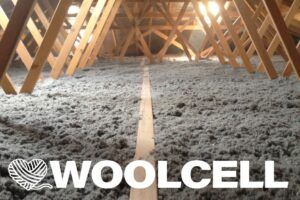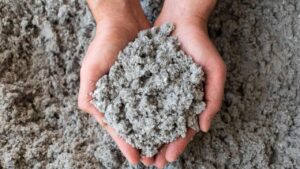“Is insulation flammable?”
It’s a common question for homeowners, but one that is often shrouded in mystery and misinformation.
The answer, it might not be surprising to hear, is that it depends. Some insulation materials are more flammable than others, and how well insulation is installed can be a factor as well.
Read this article for definitive answers, including comparisons of the flammability of each main insulation types,
The Flammable Insulation Myth Busted
Many people believe that insulation is flammable, and for a long time they wouldn’t have been wrong. Many flammable materials have been used as insulation products throughout history. This makes people especially concerned about the flammability of insulation in old houses.
Cellulose, which is made primarily of paper, has an undeserved stigma because its earlier versions were highly flammable before flame retardants were introduced.
In reality though, with modern building codes, R-Values and regulations, a highly flammable insulation simply cannot exist in the Australian market.
What is Flame Retardant Insulation?
Most inherently flammable materials can be treated with flame retardant chemicals. When applied to insulation, these chemicals usually work in two ways.
1. Prevent Vapours
The first kind of flame retardant aims to prevent a fire from starting in the first place. It does this by interrupting the atomic chain reaction that leads to the ignition of the material.
2. Charring
Charring is designed to stop the flame in its tracks. When fire burns the surface of a retardant material, it forms a tough char layer of carbon, rather than burning all the way through. This layer not only protects the insulation (and the timber framing behind it), but it also limits the amount of smoke that can escape from the material.
Which Insulation is the Most Flame Retardant?
Cellulose
Cellulose insulation is now considered one of the most flame retardant insulations on the market.
Flame retardant chemicals mean modern cellulose barely melts at all. While flames will char the surface and eventually cause loss of integrity, this process takes far longer than alternative insulations. In fact, it has a higher melting threshold than some metals, including coins.
Controlled tests have proven cellulose to be 57% more flame retardant than fibreglass insulation. However, more surprisingly, they have also proven it to be superior to uninsulated buildings. That means installing cellulose insulation actually makes your house safer than having no insulation at all.
Polyester
Polyester insulation functions similarly to cellulose when it burns. It melts very slowly, and doesn’t spread the flame at all. In fact, it’s designed to self-extinguish once it’s no longer being directly exposed to a flame. It is also odourless and gives off comparatively little smoke compared to other insulations on this list.
Polystyrene
Polystyrene melts quickly under flame. This is a concern because of how quickly it may expose timber framing. On the other hand, it doesn’t continue to burn at all once the flame is removed, and it releases relatively mild amounts of smoke.
Fibreglass Batts
While fibreglass may not spread flames, it doesn’t withstand them very well either. Fibreglass will quickly melt away and lose shape when direct flame is applied. This then exposes the timber framing to the fire.
More concerningly, many fibreglass batts have paper linings on the internal facing side, This paper can quickly catch fire and add to the spreading flames.
Foam (Closed Cell)
Closed cell polyurethane foam is a difficult insulation to judge. While it does melt away, it doesn’t smoulder at all once the source of the flame is gone. While this may sound positive, it unfortunately yields a thick, black smoke while burning and afterward. If this smoke breaches the internal walls of the home, it can worsen the chances of smoke inhalation.
Contact a Professional Insulation Installer
Aside from the flame retardant nature of most Australian insulation materials, there is another factor in how well your insulation can protect your home during a fire.
How well it is installed!
Insulation that has been professionally installed offers superior flame resistance, and will be much better at keeping your home temperate and comfortable.
Thankfully, at 4 Seasons Insulation we are experts at installing insulation. Our insulation will be effective for the entire lifetime of your home. Contact us today for a quote and advice about the best insulation option for your needs.
For more information about our services, visit our website.




















